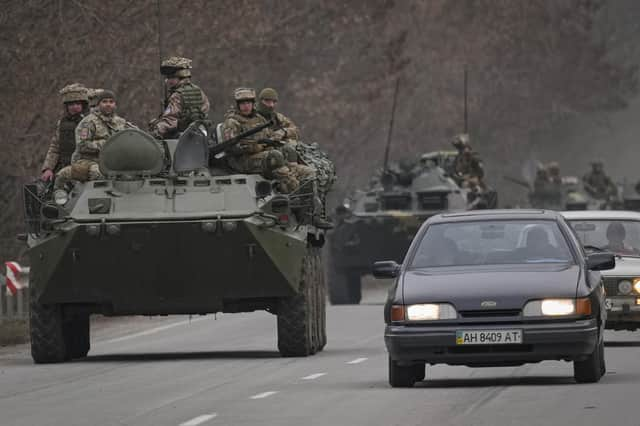Economist: The invasion of Ukraine will have an unavoidable economic impact on Northern Ireland


Supply side difficulties and inflation pressures were building.
And now there is the further blow to that recovery posed by the economic impact of the escalating war in the eastern Ukraine.
Advertisement
Hide AdAdvertisement
Hide AdRussia is a reasonably sizeable national economy representing just under 3% of global output or GDP whereas the United Kingdom represents just over 2%.


The size of the Ukrainian economy would be only about one-tenth of its eastern neighbour.
Previously, the International Monetary Fund (IMF) had been estimating Russian economic growth could have been about 3% this year and similarly for the Ukraine.
If both those growth rates are now reduced to zero given the hostilities that could knock about 0.1% off the world’s growth rate in 2022.But, much more seriously, disruption in energy and agricultural markets could now knock several percentage points off economic growth rates throughout the Western world.
Advertisement
Hide AdAdvertisement
Hide AdProbably the most apparent impact here in the West will be through higher energy prices.
Russia provides 35-40% of the oil and gas consumed in Western Europe.
An impact on price here in Northern Ireland and the United Kingdom more generally is unavoidable.
Then there is a range of sectoral impacts.
To the extent that Northern Ireland farms use corn as feeds it will be relevant that Russia and Ukraine are leading grain exporters (for some poorer countries dependent on wheat coming off the Russian-Ukrainian steppes the effects could be disastrous).
Advertisement
Hide AdAdvertisement
Hide AdWorld prices for wheat, honey and sunflower oil could now spike.
There will be difficulties for parts of aerospace manufacturing given that Russian is a major suppler of titanium- Airbus uses that metal in its jet liner construction.
Admittedly, in the longer term we are probably looking at world where the UK, along with other countries, will be spending more on defence.
Hence markets could expand for Spirit AeroSystems, Harland and Wolff etc. A shipyard in Scotland has been building frigates for the Ukrainian navy — it has to hoped that the Ukrainian government will still be around to receive that order in due course.
Advertisement
Hide AdAdvertisement
Hide AdOne effect which should be quite small is in terms of export markets.
Northern Ireland’s exports to Russia (reduced in the past given previous rounds of sanctions) were never very large and in 2020 amounted to about £30m.
Of course, all the above is to trace only the economic bill. The greatest tragedy will be the loss of life.
The ‘low level’ hostilities which have existed in the Donbass region of the Ukraine have killed 14,000 people since 2014.
Advertisement
Hide AdAdvertisement
Hide AdIn other words, the equivalent to four times our Troubles in only eight years.
One of the sad ironies of the current situation is that the last time Russian Army tanks drove into the eastern Ukraine was in 1943 but that time they were liberating the territory from the Nazis”.
• Dr Esmond Birnie is Senior Economist at the Ulster University Business School